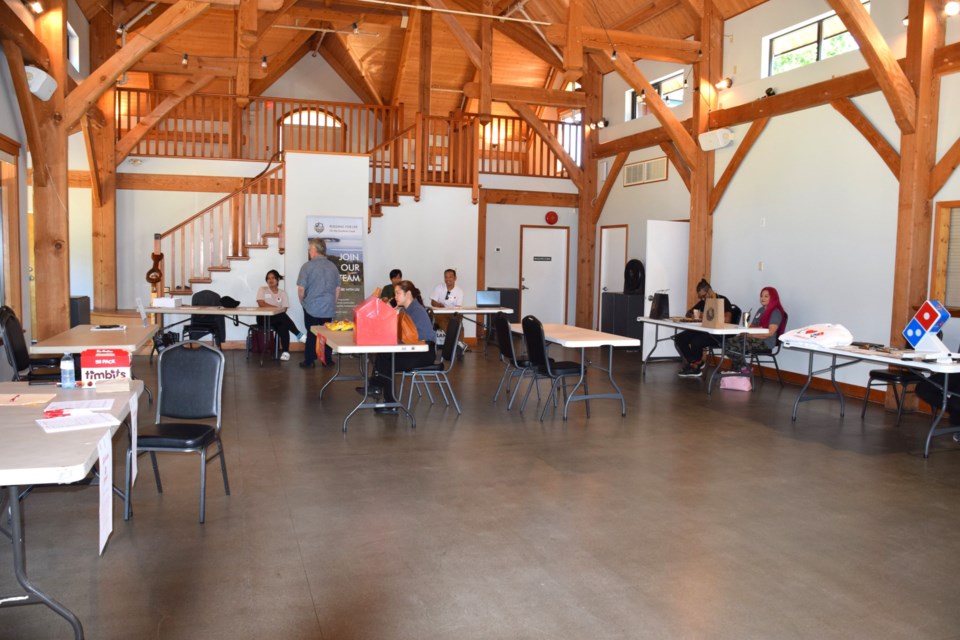An hour into a job fair held July 29 at Seaside Centre, there was no sign of any potential employees.
Tables lining each of the walls were stationed with employers eager to fill vacant positions, armed with application forms and, in some cases, small incentives including free T-shirts, Timbits, and food coupons.
Agnes Cabe, one of the organizers of the event, said the goal of the job fair was twofold.
First and foremost, she said, was to give anyone looking for a job an opportunity for employment. Secondly, and possibly more importantly, was to prove the point that temporary foreign workers aren’t taking jobs away from locals and long-time residents.
“So, we're listing down those applicants and keeping a record of who’s coming,” Cabe told Coast Reporter during the event. “And we’re keeping track of who’s a foreign worker, so we’ll have data to present to the federal government that says, ‘Hey, this is what’s going on with us and we have the facts to support it.”
Cabe is also one of the organizers of the ad-hoc group Keep Families Together, created in response to the changes around temporary foreign workers introduced by the federal government Jan. 21, which added restrictions to its open work permit (OWP) eligibility for family members of international students and foreign workers.
In addition, the foreign worker must also have at least 16 months remaining on their work permit at the time when their spouse applies for the OWP. Dependent children of foreign workers will no longer be eligible to apply for an OWP.
Cabe said over the course of the three-hour job fair, 16 potential employees dropped by to check out the 13 employers in attendance. She later heard, two full time and one part-time position was filled. The event was advertised in Coast Reporter and shared heavily on social media, including on several Facebook pages.
“I think you'll agree this low turnout confirms that anyone who is available and wants to work, has found jobs,” said Cabe. “That's the Keep Families Together point — much needed workers, like me, are not taking jobs from local people — rather, we and our spouses are doing jobs that the Coast badly needs filled.”
In response to the changes to the OWP, District of Sechelt Mayor John Hendrson is advocating to have the Sunshine Coast included in the federal government's Rural Community Immigration Program. Through the program, 14 communities across B.C. have been chosen for a pilot project and given an opportunity to show they can support and benefit from skilled migrants. These communities are approving certain employers to hire for jobs they can’t fill with local workers.
To that end, Henderson helped organize the job fair and was there to witness the results firsthand.
“I'm of two minds. I hope people show up, because they'll get hired. You know, these people are employers. They need the staff and that's what is, systemically, the problem with the change in immigration, that we're not kicking people out that are surplus to our needs,” said Henderson. “We're taking people away from jobs where there are no other people on the Coast who will do that. So, this event today, is one example.”
Henderson noted at many stores and restaurants across the Coast, it’s common to see “Help wanted” signs posted on walls or set up on host counters.
“The idea that immigration is ruining Canada is a view I'm not even going to talk about, because you can't. One size doesn't fit all in Canada,” said Henderson. “And here on the Coast, we have a shortage of workers. There's too many of us older folks and we don't have the kids or the kids don't live here. So, to kind of allude that immigration is ruining the Sunshine Coast, my comment very directly is, if it wasn't for immigration, we would have a horrible problem. Every industry is relying on much-needed workers, the so called ‘temporary foreign workers.’ I call them much-needed workers.”
Henderson said temporary foreign workers are filling positions in the food and beverage industry, retail, in banks, at BC Ferries and in the health-care industry, including positions at the hospital.
“Everybody is relying on these people. So, what we're doing here at this event is, hopefully, getting some people hired if they show up and, to that extent, if we don't get very many, the comment is it’s because they're all working,” said Henderson. “And they're not in here looking for entry-level jobs for, you know, two hours a week. Every one of them in here would hire middle managers, even senior managers, to work.”
On a personal note, Cabe said changes to the OWP are already resulting in some families being torn apart, or being forced to leave Canada — a place they now call home — to return to a life of poverty.
“The very core of this, is it’s all about our families and now we have to choose between work and family,” said Cabe. “It's a big sacrifice.”



